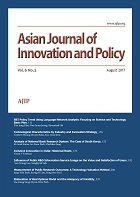 ISSN : 2287-1608
ISSN : 2287-1608
The Flexible Application of Real Options for Subcontractor in the Soft Drink Manufacturing Industry
Takao Fujiwara (Toyohashi University of Technology)
Abstract
In the soft drink industry, especially small and medium enterprises in Japan, there is a possibility of conversion from a labor-intensive industry to a capital-intensive. The demand for soft drinks may not be satisfied in the summer because the supply is too low to meet the demand. To address this situation, this paper proposes optimal investment that integrates demand uncertainty, based on real options approach (ROA) and seasonal autoregressive integrated moving average. Two alternative options are compared and evaluated. One is the Bermudan option: to employ additional workers to elevate efficiency in summer and laying off in winter, this attitude is repeated each year. The other is the American option: to replace equipment to increase machine ability throughout the year. Results in ROA show that the highest improvement is gained if the two options are in a symbiotic relationship. Soft drink producers should search for replacing equipment, using the employees repeatedly. A temporary decision is not equal to an infinite decision.
- keywords
- Real options approach, seasonal autoregressive integrated moving average, soft drink, uncertain demand
Reference
Allen, T.T. (2011) Probability Theory and Monte Carlo in Introduction to Discrete Event Simulation and Agent-based Modeling, London: Springer, 9-27.
Barnett, M.L. (2005) Paying attention to real options, R&D Management, 35(1), 61-72.
Bhat, A. and Kumar, A. (2008) Applicaion of the crystal ball software for uncertainty and sensitivity analyses for predicted concentration and risk levels, Environmental Progress. 27(3), 289-294.
Black, F. and Scholes, M. (1973) The pricing of options and corporate liabilities, Journal of Political Economy, 81 (3), 637-654.
Bouzerdoum, M., Mellit, A. and Pavan, A.M. (2013) A hybrid model (SARIMA-SVM) for short-term power forecasting of a small-scale grid-connected photovoltaic plant, Solar Energy, 98, 226-235.
Box, G.E., Jenkins, G.M., Reinsel, G.C. and Ljung, G.M. (2016) Time Series Analysis Forecasting and Control, 5th Edition, John Wiley and Sons.
Brealey, R.A., and Myers, S.C. (2003) Principles of Corporate Finance, 7th Edition, McGraw-Hill.
Brown, R.G. (1963) Smoothing, Forecasting and Prediction of Discrete Time Series, Englewood Cliffs, N.J.: Prentice-Hall.
Chan, Y. (2011) A Software Survey of Analytics and Spatial Information Technology in Location Theory and Decision Analysis, Heidelberg: Springer, 411-440.
Chang, H.S., Hu, J., Fu, M.C. and Marcus, S.I. (2013) Simulation-based Algorithms for Markov Decision Processes, 2nd Edition, London: Springer.
Codex Alimentarius International Food Standards (2003) General principles of food hygiene (CAC/RCP 1-1969), Http://www.codexalimentarius.org/download/standards /23/CXP_001e.pdf, Accessed on 6 January 2015.
Coleman, J.R., Smidt, S. and York, R. (1964) Optimum plant design for seasonal production, Management Science, 10(4), 778-785.
Coleman, J.R. and York, R. (1964) Optimum plant design for growing market, Industrial and Engineering Chemistry, 56(1), 28-34.
Copeland, T. and Antikarov, V. (2003) Real Options: A Practitioners Guide, New York: Texere LLC.
de Neufville, R., ASCE, L.M., Scholtes, S. and Wang, T. (2006) Real options by spreadsheet: parking garage case example, Journal of Infrastructure Systems, 12, 107-111.
EPM Information Development Team (2012) Oracle Crystal Ball Predictor User’s Guide (Release 11.1.2.2), Http://docs.oracle.com/cd/E17236_01/epm.1112/cb_predic tor_user. pdf, Accessed 25 January 2015.
Foundation for Food Safety Certification (2014a) Food safety system certification 22000, http://www.fssc22000.com/documents/pdf/certificationscheme/fssc22000_fe atures-v3.1_2014.pdf, Accessed on 6 January 2015.
Foundation for Food Safety Certification (2014b) Scheme, Http://www.fssc22000.com/documents/standards.xml?lang=en, Accessed on 6 January 2015.
Food Marketing Research and Information Center (2015) Statistic tables for food produce, Http://www.fmric.or.jp/stat/nenpou/26doutaisyokuhinseizougyoutoukeihyo u.xlsx, Accessed on 25 June 2015.
Fujiwara, T. (2014) Real options analysis on strategic partnerships of biotechnological startups, Technology Analysis and Strategic Management, 26(6), 617-638.
Glasserman, P. (2003) Monte Carlo Methods in Financial Engineering, New York: Springer.
Kato, M. and Zhou, M. (2010) A basic study of optimal investment of power sources considering environmental measures: economic evaluation of CCS through a real options approach, Electrical Engineering in Japan, 174(3),9-17.
Kume, K. and Fujiwara, T. (2016a) Effects of the exercisable duration and quantity of real options in multistages, Technology Transfer and Entrepreneurship, 3, 107-118.
Kume, K. and Fujiwara, T. (2016b) Production flexibility of real options in daily supply chain, Global Journal of Flexible Systems Management, 17, 249-264.
Luenberger, D.G. (2009) Investment Science: International Edition, Oxford University Press.
Merton, R.C. (1973) Theory of rational option pricing, Bell Journal of Economics and Management Science, 4(1), 141-183.
Mortimore, A. and Wallace, C. (2013) HACCP: A Practical Approach, Springer.
Mun, J. (2003) Real Options Analysis Course: Business Cases and Software Applications, Hoboken, NJ: John Wiley.
Myers, S.C. (1977) Determinants of corporate borrowing, Journal of Financial Economics, 5(2), 147-175.
Pindyck, R.S. (2008) Sunk costs and real options in antitrust analysis, Issues in Competition Law and Policy, 1, 619-640, Http://web.mit.edu/rpindyck/www/Papers/ Vol.%20IChap.%2026CompetitionLaw_m1.pdf, Accessed on 21 March 2014.
Oracle (2009) Crystal Ball Predictor User’s Guide (ver. 11.1.1.3).
Ravi Mahendra, G. (2009) Industrial statistics and operational management 6: Fore-casting techniques, Http://nsdl.niscair.res.in/jspui/bitstream/123456789/829/1/CHA-PTER-6%20FORECASTING%20TECHNIQUES-%20Formatted.pdf, Access-ed on 1 December 2015.
Rosqvist, T.J. (2010) Capacity investment planning based on real options in Amadi-Echendu, J.E., Brown, K., Willett, R. and Mathew, J. (Ed.) Definitions, Concepts and Scope of Engineering Asset Management, Springer-Verlag London.
Schneider, J.J. and Kirkpatrick, S. (2006) Stochastic Optimization, Berlin: Springer.
Shibata, R. (1976) Selection of the order of an autoregressive model by Akaike’s information criterion, Biometrika, 63, 117-126.
Trigg, D.W. (1964) Monitoring a forecasting system, Operational Research Quarterly, 15(3), 271-274.
Wright, J.F. (2002) Monte Carlo Risk Analysis and Due Diligence of New Business Ventures, New York: Amacom.
- 49Downloaded
- 177Viewed
- 0KCI Citations
- 0WOS Citations

